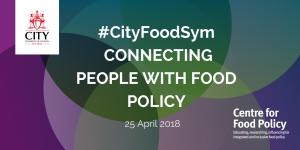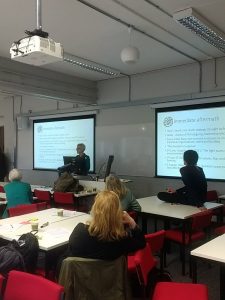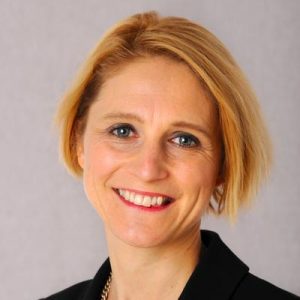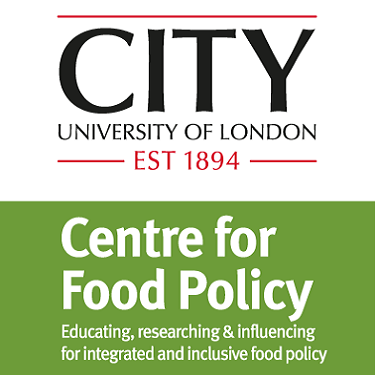In this Dispatches post, Centre Director, Professor Corinna Hawkes, reflects on the recent City Food Symposium and the importance of citizen-generated evidence.
You can find the slides of her opening presentation here.
The first project I ever did on food policy – 20 years ago now – was on food poverty in the UK. Since then, food banks have become institutionialised as the prevalence of food insecurity has risen. I then moved onto international work, focusing on the prevention of obesity and diet-related non-communicable diseases. In that time, both have also inexorably risen around the world.
So it is on a daily basis that I ask myself: why are we not managing to effect more change? It is easy to point fingers – and we should, sometimes at ourselves. Governments are not taking a hard enough line; food companies are hedging their bets; advocacy by NGOs is too weak; academics are working in silos. All of these things are true. But there is another aspect that has been troubling me for some time: that collectively, we are not doing enough to understand how people – citizens, communities – are experiencing the problems we are seeking to address. And this means that even when actions are being taken – and there is a lot of action being taken – we are not taking into account how people will respond to them. This means we are missing opportunities to design them better. A simple example comes from Hugh Fearnley-Whittingstall’s TV programme last week. Hugh, with the best of intentions, drove into a deprived neighourhood in Newcastle, UK, with a fruit and veg van. Did people come? Well, yes, some did, but most did not. He realised he was going to have to understand the community better before cooking up solutions from the outside and parachuting in (it was to his credit that he realised this).
I have been sharing these concerns for a while now. Some have brushed them away, saying that the real problem is the systems that create food-related challenges. I agree. My point is that in designing solutions, we cannot ignore the fact that people are not separate from the systems that shape their everyday lives. And people respond to their circumstances – and the policies and actions designed to change them – in ways which are difficult for an external “expert” fully to understand. People, in other words, have evidence that emanates from their “lived experience”. This is knowledge that is impossible to obtain only from the outside. People’s experiences do reflect many things that outsiders can count – how much a farmer is paid for their crop, how many fast food stores there are, how much income someone has. But how people – and that means us all – respond to problems also reflects our feelings and human frailty. Feelings around identity, powerlessness, anger, shame, prejudice, vulnerability, exclusion, desire, hopefulness may not be “rational” but are a human reality that influence how we respond to our circumstances – and are shaped by them. Obtaining evidence of this “lived experience” is thus a starting point for exploring systemic issues that lie beneath people’s perspective on their own realities.
In the first instance, this simply means listening to people about their experiences. In the second, it means involving people in co-designing solutions and having a voice in demanding change. In the third, it means doing something with this – making sure what is learned feeds into what actions are taken, and how they are designed and implemented.
 On April 25 2018, the Centre for Food Policy hosted our annual City Food Symposium dedicated to this topic. It explored how we can gather evidence of lived experience and how we can translate it into more effective and equitable action. It brought together people who are way ahead of me in their understanding of these issues. For there are indeed many in advocacy, policy and research who have been grappling with these issues for a good while, and even more who are coming into it. We welcomed Cristina Perez Parsons to talk about the NCD Alliance’s Our Views Our Voices global advocacy programme, and Alejandro Guarin and Natalie Lartey on what the International Institute for Environment and Development, Hivos and their Ugandan partner are learning from people’s experiences of their own diets in Western Uganda. We heard from Francesca Sanders from the UK’s Food for Life programme about their user-centred approach to designing food services for older people, and from Professor Wendy Wills about what she learned from listening to teenagers about their experience of school lunch. We heard from Elise Wach about an Institute of Development Studies project on transitions to agroecology with farmer participation in rural areas of Africa and Latin America, and from Anna-Maria Volkmann about what the Cities Changing Diabetes programme is learning about the factors that lie beneath food-diabetes in Houston, Mexico City,
On April 25 2018, the Centre for Food Policy hosted our annual City Food Symposium dedicated to this topic. It explored how we can gather evidence of lived experience and how we can translate it into more effective and equitable action. It brought together people who are way ahead of me in their understanding of these issues. For there are indeed many in advocacy, policy and research who have been grappling with these issues for a good while, and even more who are coming into it. We welcomed Cristina Perez Parsons to talk about the NCD Alliance’s Our Views Our Voices global advocacy programme, and Alejandro Guarin and Natalie Lartey on what the International Institute for Environment and Development, Hivos and their Ugandan partner are learning from people’s experiences of their own diets in Western Uganda. We heard from Francesca Sanders from the UK’s Food for Life programme about their user-centred approach to designing food services for older people, and from Professor Wendy Wills about what she learned from listening to teenagers about their experience of school lunch. We heard from Elise Wach about an Institute of Development Studies project on transitions to agroecology with farmer participation in rural areas of Africa and Latin America, and from Anna-Maria Volkmann about what the Cities Changing Diabetes programme is learning about the factors that lie beneath food-diabetes in Houston, Mexico City,  Johannesburg and Vancouver. Matthew Thomson of the Cornwall Food Foundation talked to us about the value of drawing on stories of people who experience food poverty, and Tianna Gaines-Turner and Sherita Mouzon shared with us how the Witness to Hunger programme in Philadelphia had given them a voice in talking about what hunger had done to them. Alexandra Wanjiku Kelbert shared with us the difference listening to people who had experienced food price volatility in a range of low/middle income countries had made in how they understood its effects – and Janette Lowe from rural Victoria, Australia, on how involving the local community in designing solutions to obesity has led to greater action to effect change (and declines in obesity). And we heard from national governments too – the work the Canadians are doing to consult their communities as they develop a Food Policy for Canada, and the work the UK Food Standards Agency are doing to understand trust in the food system.
Johannesburg and Vancouver. Matthew Thomson of the Cornwall Food Foundation talked to us about the value of drawing on stories of people who experience food poverty, and Tianna Gaines-Turner and Sherita Mouzon shared with us how the Witness to Hunger programme in Philadelphia had given them a voice in talking about what hunger had done to them. Alexandra Wanjiku Kelbert shared with us the difference listening to people who had experienced food price volatility in a range of low/middle income countries had made in how they understood its effects – and Janette Lowe from rural Victoria, Australia, on how involving the local community in designing solutions to obesity has led to greater action to effect change (and declines in obesity). And we heard from national governments too – the work the Canadians are doing to consult their communities as they develop a Food Policy for Canada, and the work the UK Food Standards Agency are doing to understand trust in the food system.

There is a lot of exciting work going on. These talks – and the afternoon workshops hosted by The Leadership Centre, Shift Design, Nourish Scotland, the RSA Food, Farming and Countryside Commission, Food Power, the Healthy Hoods project, and the Food Standards Agency – produced a lot of learnings for moving forward. These learnings will be captured in our report from the Symposium.
One message came through loud and clear: reality is messy and food policy needs to accept that reality. And, as highlighted by my colleague Claire Marris in her reflections on the day, reality can be uncomfortable. When we are listening, then, judgment needs to leave the room.
But hard as it is, engaging with lived experience emerged as not a “nice to” but a “need to.” It’s not the fluffy stuff we do on the side while the big guys get on with the important things. It may have a touch of touchy-feely about it, but at its heart, it is a very pragmatic agenda. Thus I very much welcomed Bill Vorley’s closing remarks – that one of our first jobs is to change the view that citizen-generated evidence (the subject of an excellent IIED report released on the day of the Symposium) is not worthy of attention by the policy community. It is. Let’s embrace real life to drive forward real change.



Leave a Reply